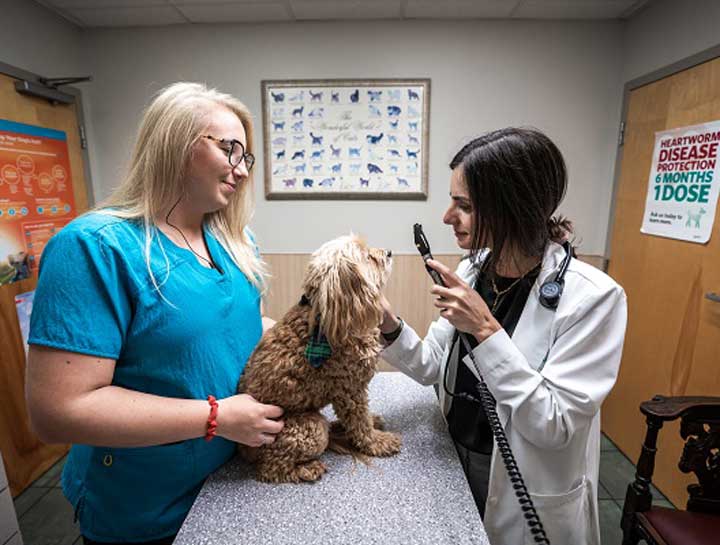Why Your Pet Needs a Routine Vet Check

ON THIS PAGE:
It’s safe to say the vast majority of pet parents wouldn’t hesitate to bring their pet to the vet if they got sick, but many wonder why routine vet checks are necessary. Just what does a routine vet check up consist of and how often should a pet get a checkup?
What Happens at a Routine Vet Check?
When your pet arrives for their wellness exam, we start with a weight check. Next, the nurse will go over your pet’s history and habits, and any issues you would like to discuss with the veterinarian.
The vet will briefly look over those notes and then be in to see your pet. During the exam, your vet will listen to your pet's heart and lungs, assess their body condition, and check the eyes, ears, and teeth. The doctor may recommend a dental cleaning and work with you to schedule it.
Next, the vet may order bloodwork along with a urinalysis. If any vaccines are due, he or she will administer these, and fill any flea and heartworm prevention medication. The doctor will go over any concerns you may have and answer your questions.
So that was the short version of what happens during a routine exam, but why are each of those things important to the health of your pet?
Weight Check
This not only gives us an idea of whether your pet is at a healthy weight, but it allows us to compare the weight to the last visit. If there is a need for any medications, we will also use your pet’s current weight to calculate the proper dosage.
Physical Exam
Listening to your pet’s heart and lungs for abnormal sounds is an important part of the exam. The vet listens to different points on the body which can help determine what is causing any abnormalities. For the heart, a steady, regular rhythm should beat at a normal speed. Heart murmurs, or irregular heart rhythms, could indicate that heart disease is present. When listening to the lungs, abnormal lung sounds like crackling or wheezing could indicate fluid buildup.
A check of the eye can reveal signs of viral, bacterial, or other infections and diseases. A look inside ears can reveal signs of yeast, ear mites, and other ailments.
Dental Exam
When we “flip the lip” to check your pet's teeth, we’re not just checking to see if they’re pearly white. There’s more than meets the eye when it comes to dental health. That’s because there’s so much more at stake than just the health of your pet’s teeth and gums. Along with painful tooth decay and abscesses, periodontal disease can occur below the gumline. Any resulting bacteria can travel to vital organs, leading to heart, liver, or kidney disease. Just like humans, pets need dental X-rays and professional dental cleanings too. These must be performed under anesthesia as that is the only way to truly see and clean below the gumline.
Vaccines
Vaccines are vital to protect your pet from preventable diseases that can be fatal. The vaccines that your veterinarian recommends for your pet may vary based on what is required by law, your pet’s environment and lifestyle, and your geographical region. For a full discussion on vaccines, the diseases they protect against, and the symptoms of those diseases, check out our dog and cat blog posts on the importance of vaccines.
Parasite Prevention
Parasites impact not only the health of your pet, but can also affect your family and home as well. Fleas can carry tapeworms and can also cause severe anemia and skin allergies. Ticks carry all manner of tick-borne diseases. Heartworms are transmitted from infected animals to your pet by mosquitos, which means that even indoor pets are at risk. Treatment for heartworms in dogs is expensive and devastating to the health of your pet. Unfortunately, there is no approved heartworm treatment for cats, which makes it very important to have them on a monthly preventative.
It is important that all pets be on appropriate parasite prevention for their geographical area. Many parts of the United States, such as Florida, require year round flea, tick, and heartworm prevention, even for indoor pets. Options vary from topical, oral, and injectable preventatives, so ask your vet which is right for your pet.
Lab Work
Bloodwork and urinalysis gives us an important diagnostic tool in detecting and treating diseases before clinical signs appear. That means your pet can often receive care before symptoms start, which not only helps your pet live a happier, healthier life, but makes health care less costly in the long run.
How Often Should My Pet Get a Routine Vet Check?
So just how often should your pet go to the vet for a routine wellness check up? Remember, pets age at a much faster rate than we do, so while it’s recommended that humans go to their doctor for an annual wellness exam, our pets should go see their vet twice a year. When pets only see their veterinarian when they’re sick, it’s difficult to establish a baseline of health that would make a decline harder to discern.
We hope this has answered your questions about why routine checkups are so vital, what a routine vet checkup consists of, and how often your pet should get a checkup.
